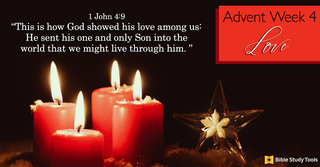
- Recent Translations
- All Translations
1 Giovanni 4 Commentary
Chapter 4
Believers cautioned against giving heed to every one that pretends to the Spirit. (1-6) Brotherly love enforced. (7-21)
Verses 1-6 Christians who are well acquainted with the Scriptures, may, in humble dependence on Divine teaching, discern those who set forth doctrines according to the apostles, and those who contradict them. The sum of revealed religion is in the doctrine concerning Christ, his person and office. The false teachers spake of the world according to its maxims and tastes, so as not to offend carnal men. The world approved them, they made rapid progress, and had many followers such as themselves; the world will love its own, and its own will love it. The true doctrine as to the Saviour's person, as leading men from the world to God, is a mark of the spirit of truth in opposition to the spirit of error. The more pure and holy any doctrine is, the more likely to be of God; nor can we by any other rules try the spirits whether they are of God or not. And what wonder is it, that people of a worldly spirit should cleave to those who are like themselves, and suit their schemes and discourses to their corrupt taste?
Verses 7-13 The Spirit of God is the Spirit of love. He that does not love the image of God in his people, has no saving knowledge of God. For it is God's nature to be kind, and to give happiness. The law of God is love; and all would have been perfectly happy, had all obeyed it. The provision of the gospel, for the forgiveness of sin, and the salvation of sinners, consistently with God's glory and justice, shows that God is love. Mystery and darkness rest upon many things yet. God has so shown himself to be love, that we cannot come short of eternal happiness, unless through unbelief and impenitence, although strict justice would condemn us to hopeless misery, because we break our Creator's laws. None of our words or thoughts can do justice to the free, astonishing love of a holy God towards sinners, who could not profit or harm him, whom he might justly crush in a moment, and whose deserving of his vengeance was shown in the method by which they were saved, though he could by his almighty Word have created other worlds, with more perfect beings, if he had seen fit. Search we the whole universe for love in its most glorious displays? It is to be found in the person and the cross of Christ. Does love exist between God and sinners? Here was the origin, not that we loved God, but that he freely loved us. His love could not be designed to be fruitless upon us, and when its proper end and issue are gained and produced, it may be said to be perfected. So faith is perfected by its works. Thus it will appear that God dwells in us by his new-creating Spirit. A loving Christian is a perfect Christian; set him to any good duty, and he is perfect to it, he is expert at it. Love oils the wheels of his affections, and sets him on that which is helpful to his brethren. A man that goes about a business with ill will, always does it badly. That God dwells in us and we in him, were words too high for mortals to use, had not God put them before us. But how may it be known whether the testimony to this does proceed from the Holy Ghost? Those who are truly persuaded that they are the sons of God, cannot but call him Abba, Father. From love to him, they hate sin, and whatever disagrees with his will, and they have a sound and hearty desire to do his will. Such testimony is the testimony of the Holy Ghost.
Verses 14-21 The Father sent the Son, he willed his coming into this world. The apostle attests this. And whosoever shall confess that Jesus is the Son of God, God dwelleth in him, and he in God. This confession includes faith in the heart as the foundation; makes acknowledgment with the mouth to the glory of God and Christ, and profession in the life and conduct, against the flatteries and frowns of the world. There must be a day of universal judgment. Happy those who shall have holy boldness before the Judge at that day; knowing he is their Friend and Advocate! Happy those who have holy boldness in the prospect of that day, who look and wait for it, and for the Judge's appearance! True love to God assures believers of God's love to them. Love teaches us to suffer for him and with him; therefore we may trust that we shall also be glorified with him, 2Ti. 2:12 . We must distinguish between the fear of God and being afraid of him; the fear of God imports high regard and veneration for God. Obedience and good works, done from the principle of love, are not like the servile toil of one who unwillingly labours from dread of a master's anger. They are like that of a dutiful child, who does services to a beloved father, which benefit his brethren, and are done willingly. It is a sign that our love is far from perfect, when our doubts, fears, and apprehensions of God, are many. Let heaven and earth stand amazed at his love. He sent his word to invite sinners to partake of this great salvation. Let them take the comfort of the happy change wrought in them, while they give him the glory. The love of God in Christ, in the hearts of Christians from the Spirit of adoption, is the great proof of conversion. This must be tried by its effects on their temper, and their conduct to their brethren. If a man professes to love God, and yet indulges anger or revenge, or shows a selfish disposition, he gives his profession the lie. But if it is plain that our natural enmity is changed into affection and gratitude, let us bless the name of our God for this seal and earnest of eternal happiness. Then we differ from the false professors, who pretend to love God, whom they have not seen, yet hate their brethren, whom they have seen.

